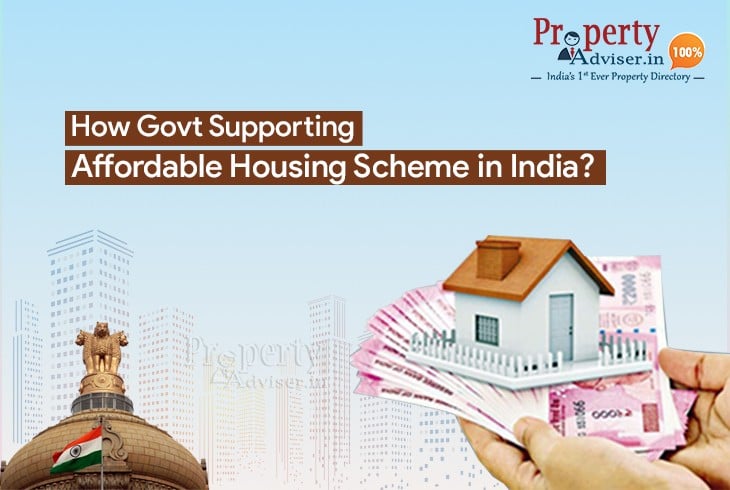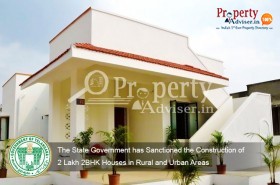in india, an affordable housing scheme was launched on june 1, 2015, by prime minister mr. narendra modi. the aim of the pmay (pradhan mantri awas yojana) was to provide low cost housing to poor people. the affordable houses are built with eco-friendly construction methods in selected cities and towns to the benefit of the urban people. adding to this credit linked subsidy scheme was introduced for pmay beneficiaries as they are eligible to get interest subsidy if they take a loan to construct or buy a house in hyderabad and other states.
hence to promote affordable housing scheme, many measures are taken by the government to support it. its initiative is to provide shelter to all needy people in india and the economic potential resulting from the mass construction of the home. this will result in additional employment, consumption of materials, etc. and this creates a chain of economic activity. its main objective is to have affordable housing for all rural and urban people by 2022.
real estate budget 2020 update: govt extends tax holiday on affordable housing scheme
in budget 2020, the new amendments made by the finance minister nirmala sitharaman to improve the country's affordable housing scheme has been commended by many real estate stakeholders.
budget 2020 has some give ways for the real estate sector and to encourage the govt initiated an affordable housing scheme, and she proposed that the rs 1.5 lakh benefit for the low-cost housing be extended to march 2021 by one year on interest paid on affordable housing loans.
according to section 80iba of the income tax act, affordable housing projects are deducted. earlier, in interim budget 2019, the extension date for ratification has been extended to march 31, 2020, to facilitate housing for all by 2022. the decision to expand tax systems on low cost housing plans for another year to cover affordable housing developments is a step in the right direction to encourage developers of affordable housing projects. it will enable the government to accomplish its goal of providing housing for all by 2022.
the tax holiday was also expanded by one year for affordable housing developers. modified tax slabs will provide the middle class with more disposable income. extension of the tax vacation period for low cost housing plans will give these projects additional room for launch. this could revive the consumption cycle of the real estate sector as well as boost the economy. moreover, individual housing investment, especially affordable housing, could see a boost in the soon future with additional savings.
builders about to launch more affordable housing projects with budget 2020 release
with affordable housing scheme to receive a further boost as the government proposed an extension of the tax break to new such projects by another year, low cost housing plans are expected to launch more. real estate developers are expected to start more affordable housing projects, which have led to a demand pattern for the past 18 months to claim a 100% tax deduction from profits.
budget 2020, considering the lower and mid-income segment most home buyers are reduced, this tax benefit is expected to boost more demand. this will support homebuyers who benefit significantly firstly from the clss interest subsidy and the substantial tax advantages. the extended clearance period by the government of such initiatives will undoubtedly mean that the real estate development sector continues to be involved in initiating and constructing affordable housing projects to help the government meet the "housing for all" goal.
what is affordable housing scheme?
a housing unit offered at low cost for the people whose income is below the average household income is affordable housing. the eligible people for an affordable housing scheme include low-income people, middle-income people, and economically weaker sections ( urban people) who have deficient levels of income. due to the high market price buying a home at an affordable rate is a vital issue in many developing countries. affordable housing in rural and urban areas need differently tailored policies as land is the primary constraint in the urban areas.
understanding the housing needs of poor people, the government has taken some measures from the last 15 years. in the beginning, the national urban housing and habitat policy (nuhhp) has set 2007 as a critical focus to provide an affordable housing scheme for all. later, it has pointed 2022 as the target year to achieve low cost housing for all objectives by making specific initiatives. the pmay affordable housing is introduced in two segments include the pmay (urban) and pmay (rural), to reach a target of housing for all by 2022.
what is pmay-u?
pradhan mantri awas yojana-urban was introduced in 2015 with the aim of constructing 20 million houses by march 31, 2022, for urban people. under the pmay scheme, financial assistance is given to states or union territories (uts) to support housing requirements. beneficiaries belonging to economically weaker sections (ews), lower income group (lig) and middle-income group (mig) in urban areas can avail interest subsidy under the scheme. as per the statement of the ministry of housing and urban affairs, in january 2019, almost 69 lakh houses were approved, of them, 13.59 lakh houses were completed.
what is pmay- g?
the pmay gramin was started in 2016 to construct low cost houses in rural areas and aimed to complete them by 2022. under the pmay scheme, nearly 1.25 crore houses were built in january 2019. as in the next month (february 2019), the cabinet has redefined target for pmay-g to 1.95 crore houses under pmay-g phase-ii up to 2022. however, the construction of affordable housing under pmay schemes are working excellently, and nearly 1.53 crore houses have been completed under the scheme as at the end of january 2019.
what measures are taken by the government to support affordable housing scheme?
- the government has taken several measures that are helping poor people to build new houses. the supporting means of government were launched in the union budget 2017-18, and they are as follows.
- allowed infrastructure status to affordable housing, as it helps developers of affordable housing to get funds from different ways, include external commercial borrowings (ecb), foreign venture capital investors (fvci), and foreign portfolio investors (fpis).
- increased the project construction completion period, the construction of affordable housing projects should complete within five years as earlier it was to be done within three years.
- one-year time is given to developers for paying tax on notional rental income on unsold completed units.
- tenure for long-term capital gains is reduced to two years as earlier it was three years for affordable housing.
- revised the qualifying criteria to the carpet area from the saleable area for affordable housing
- the refinancing facility was increased for affordable housing by national housing bank (nhb) for individual loans.
how government supported developers in affordable housing sector?
the government has introduced several measures for developers in the affordable housing segment are as follows.
- several incentives, such as subsidies, tax benefits, and institutional funding, were provided.
- housing fund (ahf) in national housing bank was formed by the government and is funded from priority sectors that are authorized by the government of india.
- several supportive measures for the housing sector were made in budget 2019, such as exemption on payment of income tax on notional rent for second own house and increased rs 2,40,000 for the tds threshold on rent.
minimized gst rates for affordable housing projects
- the gst council has decreased tax rates for affordable housing to 1% as earlier it was 8 %
- ceiling value of affordable houses below rs 45 lakhs will be exchanged with a 1% gst rate.
- the limit of carpet area for affordable houses is set as 90 sq.mts. in non-metropolitan cities and 60 sq.mts. in metropolitan cities with a ceiling value of rs 45 lakhs in both cases.
rbi efforts in affordable housing scheme
- the price of affordable residential property should be less than rs 65 lakhs in metropolitan cities and rs 50 lakhs in non-metropolitan cities.
- the central banks give loans to people who are building a house and buying flats.
- the rbi also provides loans to affordable housing under priority sector lending.
- to finance loans for affordable housing, rbi allowed banks to issue long term bonds with a minimum of seven years of maturity.
bottom line
with the real estate budget 2020, the govt aims to provide low-cost houses to all homeless and mitigate the housing gap in india. with infrastructure developments and financial assistance, the government has supported affordable housing scheme. hence, the government is providing all the support to promote affordable housing in india.
are you interested in buying a home in hyderabad at affordable rates? visit https://propertyadviser.in, the first-ever real estate property directory that lists more than 1000 properties for sale in hyderabad with detailed and verified information. visit us and make wise decisions for happy living.
by: shailaja & govi














